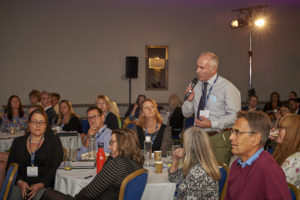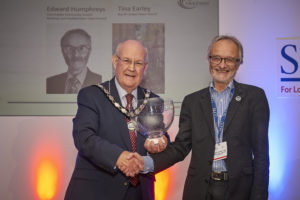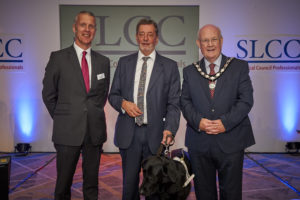SLCC held its first hybrid annual National Conference on 13 and 14 October 2021. Colleagues came together in-person at Jurys Inn Hinckley Island Hotel and online for what, if early feedback is an indication, proved to be a successful and popular format.
an indication, proved to be a successful and popular format.
The 2021 National Conference commenced with SLCC’s annual awards which were presented by SLCC President Philip Peacock PSLCC. Although some colleagues were unable to attend in-person, they were congratulated for their achievement:
New Clerk of the Year – Lisa Dyer, Ryde Town Council
Presented to a Clerk who has excelled in the early stages of their career
Bryan Metcalf Award for Volunteering – Ed Humphreys FSLCC, Churchstoke Community Council Newtown and Llanllwchaiarn Town Council and Tina Earley PSLCC, Bay of Colwyn Town Council.
Awarded in memory of one of the SLCC’s greatest and longest serving volunteers. Presented to a clerk who has demonstrated exceptional voluntary service to SLCC.
Myrna Liles Award for Branch Membership Growth – Lincolnshire branch

Best Magazine Article by a Member – Hazel Trustam, Marston Moreteyne Parish Council
Presented to the clerk who has contributed the best article to The Clerk magazine in the preceding year
John Crompton Cup for Mentoring – Anne Wilson FSLCC, Welshpool Town Council
In recognition of outstanding contribution to the progress of SLCC and to the clerks’ profession
Outstanding Contribution – Katie Walding PSLCC, Sway Parish Council
In recognition of outstanding contribution to the progress of SLCC and to the clerks’ profession
Chief Executive’s Staff Award – Yvonne Colverson FSLCC, Senior Advisor & Induction Support Officer
In recognition of outstanding service to the members of SLCC and to the clerks’ profession
Special Recognition Award – Linda Larter MBE FSLCC, Sevenoaks Town Council
In recognition of exceptional service and contribution to SLCC and the clerks’ profession over a number of years.
 Another highlight of the first day was undoubtedly the keynote speaker, The Rt. Hon. The Lord Blunkett. Lord Blunkett who now sits in the House of Lords and is focusing his work on what he calls ‘building from the bottom’, engaging people in their local communities and encouraging innovation and enterprise, making small changes which collectively have a much more wide-ranging effect. Much of the audience fell in love with his guide dog, Barley, and Lord Blunkett remarked on how having Barley along at meetings was often an ice-breaker and allowed people to feel comfortable.
Another highlight of the first day was undoubtedly the keynote speaker, The Rt. Hon. The Lord Blunkett. Lord Blunkett who now sits in the House of Lords and is focusing his work on what he calls ‘building from the bottom’, engaging people in their local communities and encouraging innovation and enterprise, making small changes which collectively have a much more wide-ranging effect. Much of the audience fell in love with his guide dog, Barley, and Lord Blunkett remarked on how having Barley along at meetings was often an ice-breaker and allowed people to feel comfortable.
Day one was brought to a close with Cllr Sue Baxter, Chair of National Association of Local Councils (NALC), and her reflections on her tenure as the first-ever female chair of NALC and the question of what still needs to be done in order that local councils remain relevant.
On the second day, delegates received presentations on Freedom of Information (FOI) requests, engaging with principal authorities, as well as an update on the work of
the Civility and Respect in Public Life Project Working Group. During the Q&A part of the Civility & Respect session, a question was raised as to why the LGA’s Model Code of Conduct includes a best practice proposal regarding the handling of complaints about the conduct of a parish councillor towards a clerk:
Best practice 11:
Formal standards complaints about the conduct of a parish councillor towards a clerk should be made by the chair or by the parish council, rather than the clerk in all but exceptional circumstances.
Below is an excerpt from the Committee on Standards in Public Life’s Review of Local Government Ethical Standards which explains.
“The evidence we received also suggested that difficulties persist in resolving standards matters where clerks are not well supported by the parish council to formally make and resolve complaints, or to prevent behaviour from recurring. Parish councils should take corporate responsibility when allegations of a councillor bullying an employee are received. For example, where behaviour that is in breach of a code is observed by councillors or reported by a clerk, the parish council should lodge a formal standards complaint corporately or in the name of the chair. A clerk should not have to do so themselves. In addition to providing necessary support to the clerk in such circumstances, such measures signify to individual councillors that disruptive behaviour is not ignored or accepted by the council generally.”
Over the two days, delegates had access to an extensive range of resources and thought-provoking sessions on topics not immediately associated with local councils but, reflecting on the conference theme ‘together we can do so much’ brought into focus how relevant the idea of small changes having large effects in communities can be.
Delegates can now complete the online feedback form, which is available on the event app, and let us know how we can meet all the needs and expectations of attendees in the future.
